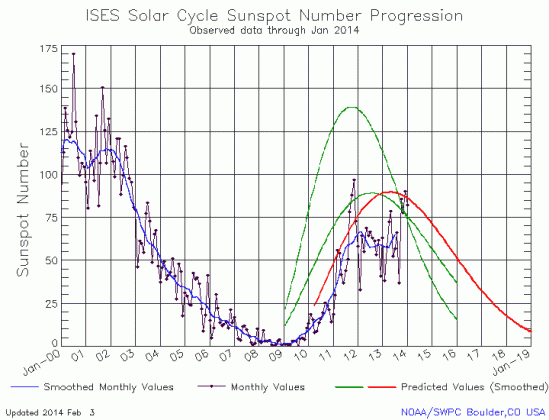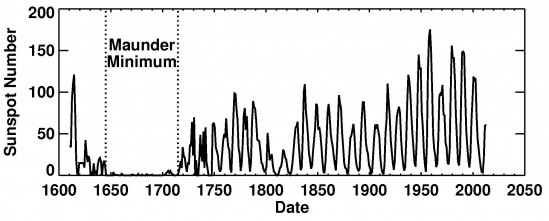The uncertainty of knowledge
NOAA this week posted its monthly update of the solar cycle, showing the sunspot activity for the Sun in January. As I do every month, I am posting it here, below the fold, with annotations.
Back in October the Sun’s sunspot activity had plummeted, following almost two years of very weak activity. At that time, I wrote, “It appears the solar maximum has ended. The only question now is how long and deep the upcoming solar minimum will be.”
Well, talk about foolish predictions. I should shake hands with Al Gore and James Hansen for making the mistake of announcing the future as if I know what will happen. The truth is that no one truly understands the Sun’s sunspot cycle.
In January the Sun continued the high sunspot activity of the previous three months, once again producing sunspots in numbers close to the actual predictions of the solar science community. And while all their predictions remain generally high when compared to the actual numbers, they can now feel reassured that the overall length and strength of this solar maximum is beginning to resemble the prediction of the solar scientists who thought this would be a weak maximum.

The graph above has been modified to show the predictions of the solar science community. The green curves show the community’s two original predictions from April 2007, with half the scientists predicting a very strong maximum and half predicting a weak one. The red curve is their revised May 2009 prediction.
Like Gore, Hansen, and many other global warming advocates, I made the mistake in October of assuming my knowledge was more certain than it was. The Sun had been relatively inactive, but that was no guarantee it would remain so. It would have been much wiser to note the lack of activity but hold off with any prediction. When knowledge is limited the uncertainties are great, which is the main point I have been making repeatedly about the solar science and climate research fields for the past decade: We really don’t know enough yet to make any rash predictions, and anyone who does make rash predictions is liable to be wrong.
This is not to say that all knowledge is uncertain. If anything, most engineering truths are real and should never be ignored. For example, when o-rings stiffen because of cold weather or when foam breaks off and chips your protective tiles, you would be a fool to say the knowledge is uncertain. There, knowledge is as certain as death, which in both cases followed shortly thereafter with the destruction of a space shuttle.
Nonetheless, for our knowledge to really grow, we must always recognize that we may be wrong, that our emotional beliefs can sometimes cloud our judgement, that sometimes the certain knowledge we think we have is not certain at all. In the case of this on-going solar maximum, I allowed myself to get ahead of the data and assumed the maximum was over three months ago, when there was really no way of knowing that. Like the solar scientists whose predictions have been consistently wrong, I face-planted myself with too much certainty. Let that be a warning to everyone, on the left as well as the right.
As for the future of the Sun, that remains a mystery. If I had to bet, I would bet on a less active Sun in the next solar cycle. Then again, if you look at the graph below of the Sun’s cycle for the past three centuries, you will note that the Sun is just as likely to recover after a weak maximum and pump out more sunspots in the following cycle. Making a prediction in this field when there is as yet so little clear understanding of the process itself is dangerous and foolhardy. And believing any prediction you read is even more foolish.
We must wait, gather data, and try to understand. With patience, our uncertain knowledge of the Sun will eventually become progressively more certain.
Of that I am certain.

On Christmas Eve 1968 three Americans became the first humans to visit another world. What they did to celebrate was unexpected and profound, and will be remembered throughout all human history. Genesis: the Story of Apollo 8, Robert Zimmerman's classic history of humanity's first journey to another world, tells that story, and it is now available as both an ebook and an audiobook, both with a foreword by Valerie Anders and a new introduction by Robert Zimmerman.
The print edition can be purchased at Amazon or from any other book seller. If you want an autographed copy the price is $60 for the hardback and $45 for the paperback, plus $8 shipping for each. Go here for purchasing details. The ebook is available everywhere for $5.99 (before discount) at amazon, or direct from my ebook publisher, ebookit. If you buy it from ebookit you don't support the big tech companies and the author gets a bigger cut much sooner.
The audiobook is also available at all these vendors, and is also free with a 30-day trial membership to Audible.
"Not simply about one mission, [Genesis] is also the history of America's quest for the moon... Zimmerman has done a masterful job of tying disparate events together into a solid account of one of America's greatest human triumphs."--San Antonio Express-News


On the uncertainty of how things work out, want to see the Taliban regret doing something? Let it become known that they mistreated or killed this dog, then you will see how the uncertainty principle works out. Might even get the president impeached if he were to choose to not act in a way that the American people thought that he should.
Muslims despise dogs and Americans love dogs. There in lies the basic problem, any group of people who come to the conclusion that dogs are to be shunned are some sick SOB’s! Keep your eye on this story.
http://www.telegraph.co.uk/news/worldnews/asia/afghanistan/10621473/The-Taliban-claim-to-have-captured-a-US-dog-of-war.html